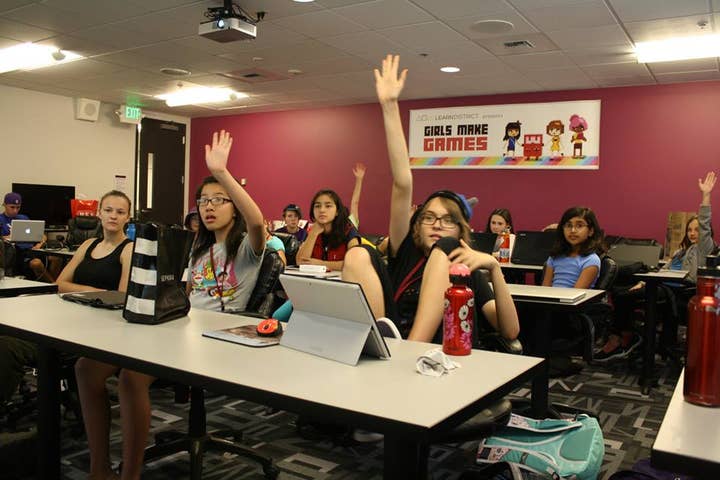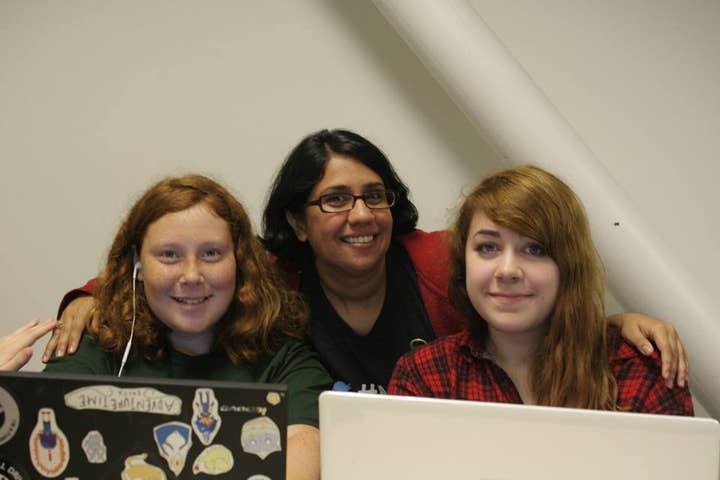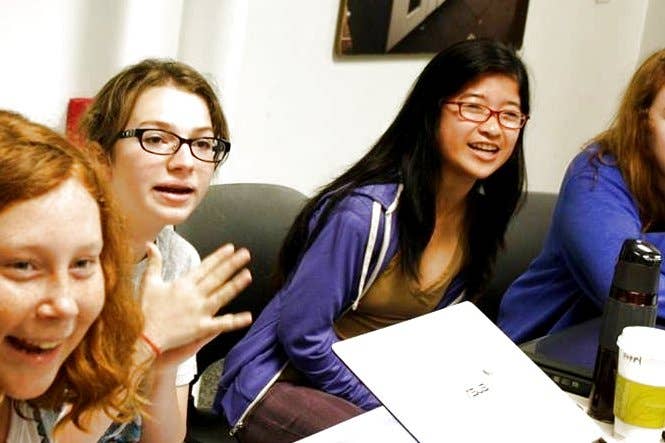Girls Make Games: Educating the developers of tomorrow
How Laila Shabir and LearnDistrict are getting a headstart on diversity in the industry
It's not standard practice for me to feel jealous of ten year olds, but hearing about Girls Make Games over the summer certainly made me feel something close to it. The scheme gives girls who love games the chance to actually make them, as well as meeting developers and like-minded peers.
It may not sound groundbreaking at first, but when you learn that many of the girls aren't even aware that game development is a potential career, you might realize why we might have a problem with gender diversity in the industry.
"The girls that come to us they know all the games. They know indie games, we have so many Fez fans, Towerfall fans, so they're very educated in that respect," says Laila Shabir, co-founder and CEO at LearnDistrict and the woman behind Girls Make Games.
"But if you ask them what do you want to do when you grow up they'll say 'I want to be a software engineer or I want to go and work at Facebook.' But if you take them on a field trip to Popcap, then they change their minds. They're like 'this is so cool, I want to work here.' They've never seen a games studio before, they've never been on a field trip there before."
"We're educating parents that games can be an end product, that the games industry is a good place"
Shabir believes that the key to changing our industry, making it more diverse, starts way before the job interviews and the glass ceilings. It starts with young girls who aren't even aware that games development is a possible career for them, young girls who think they need permission to work in video games - as if it's seedy or somehow bad.
"One question that comes up a lot when they meet other female game developers is 'how did you convince your parents to let you do this?' I think it's so funny because you never seen an 11 year old boy asking that question. He's not concerned about what his parents think.
"Girls are very socially aware, they care about what their parents think, they want to do things that are socially acceptable. And at that age no one is talking about these things as a possible career so when we have female guest speakers come in these questions pop up all the time."
It was only meant to be one workshop in the Bay Area, near where Shabir and her team were based. And it was only meant to be 15 girls. That number quickly grew to 45, then Double Fine got involved and suddenly one of the teams from that first workshop had their game funded on Kickstarter. Shabir waved goodbye to life as she knew it.

" I don't know how it got really big. I have a feeling it was demo day that really did it, which was supposed to be the final competition because we had about five teams compete for a grand prize where we had Tim Schafer, Kellee Santiago and a whole bunch of great people come in and judge their games. After that, I think on social media and everywhere else word just got out and people kept writing to us saying that the Bay Area gets everything, what about us? We're in Austin, we have a lot of girls, we have a lot of little girls who love videogames, you have to come here."
So now the team have been to LA, Austin, Seattle, San Diego and Boston. The website is also promising upcoming workshops in Washington, London, Warsaw and even Australia.
"It's definitely taken on a life of its own, it wasn't something we planned. We were working on our first game which still hasn't come out, frustratingly enough. The company is slowly starting to become two departments, so one department manages the Girls Make Games department and the other one does our games."
When Shabir starts telling stories from the camps they've had so far it's easy to understand why she's focused on Girls Make Games so entirely for the next couple of years. These are girls who are shy, girls who don't have any peers that understand the way they feel about games, girls who literally change in front of the organisers as they build their games.
"She comes in, she's super shy, she's looking at the ground the whole time, does not make eye contact with anyone...By week three she was raising her hand to answer and when she got the answer right she would do a little dance"
One girl was a Minecraft player and PlayStation fan who played games with boys but had no female peers to talk games with. Returning from camp she begged her mother to let her attend again, declaring "these are my people!" Shabir tells me about another girl, a reluctant soccer player at a super sporty school.
"She comes in, she's super shy, she's looking at the ground the whole time, does not make eye contact with anyone, not even her teammates. Over the course of three weeks, by week two, she had started talking. By week three she was raising her hand to answer and when she got the answer right she would do a little dance," says Shabir, her voice light with pride.
"Her mom still emails us and she brings her to every event that we have here because it's impacted her personality so heavily. She's gotten better at soccer because she got better at making games. "
As well as an education on the process of making again the workshop provides a safe space, a place where the weird girl who likes games when all her friends like ponies might be accepted. Shabir and her counselors also find themselves educating the parents on the possibilities in the games industry. That part has gotten a little harder thanks to the behavior conducted under the #gamergate banner, but Shabir says that just makes Girls Make Games even more important.

"We're educating them on the aspect that games can be an end product, the games industry is a good place. It's been harder this summer to do that, especially this summer for girls, because a lot of parents do know about what's going on and they'll ask questions like 'why are you promoting this? It seems like such a toxic industry.'
"That's funny because it's toxic because there are so few women to begin with. We are trying to solve the problem, imagine if we actually did have 30, 40, 50 per cent women, we wouldn't be having these problems. It's actually tackling the issue from the ground up."
The industry itself has been supportive of the scheme, with Riot Games in LA, Bioware in Austin, Popcap in Seattle, and Double Fine all opening their doors so the girls can take field trips to real studios. Shabir would also like to see companies follow models set out by the tech industry and incentivize their staff for volunteering.
"Once you're in [the industry] your job shouldn't stop there, you should hold the door open for more people"
"So aside from just generally supporting and opening doors I think in the tech industry there are some really great models where people have paid volunteer time. They have their employees go out and support causes, where they take a week or two off and they can go and teach at a camp or at a workshop. But it's paid volunteer time because the company is paying for it," she explains.
"Once you're in [the industry] your job shouldn't stop there, you should hold the door open for more people."
Shabir has her own games to make with LearnDistrict, but she's committed to Girls Make Games for the next couple of years to make sure it stays on track as it expands.
"I'm going to stay very involved and make it an impactful organisation. So we're just not doing the talk, we're actually walking the walk. It would be really great to see some of our girls actually graduate and go to game school and enter the industry."
For more on how you can help Girls Make Games, or to find out more about upcoming workshops, visit the official site.


